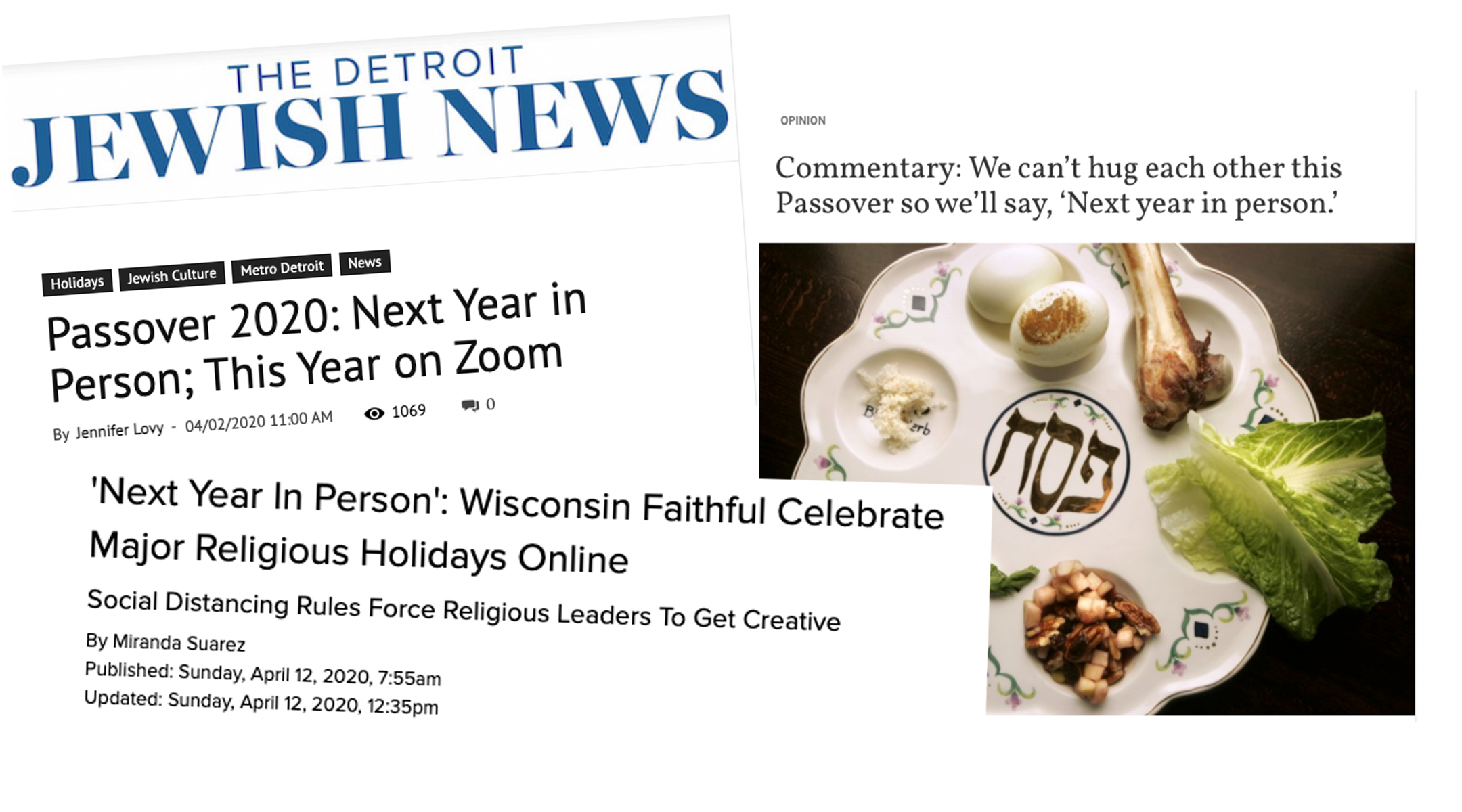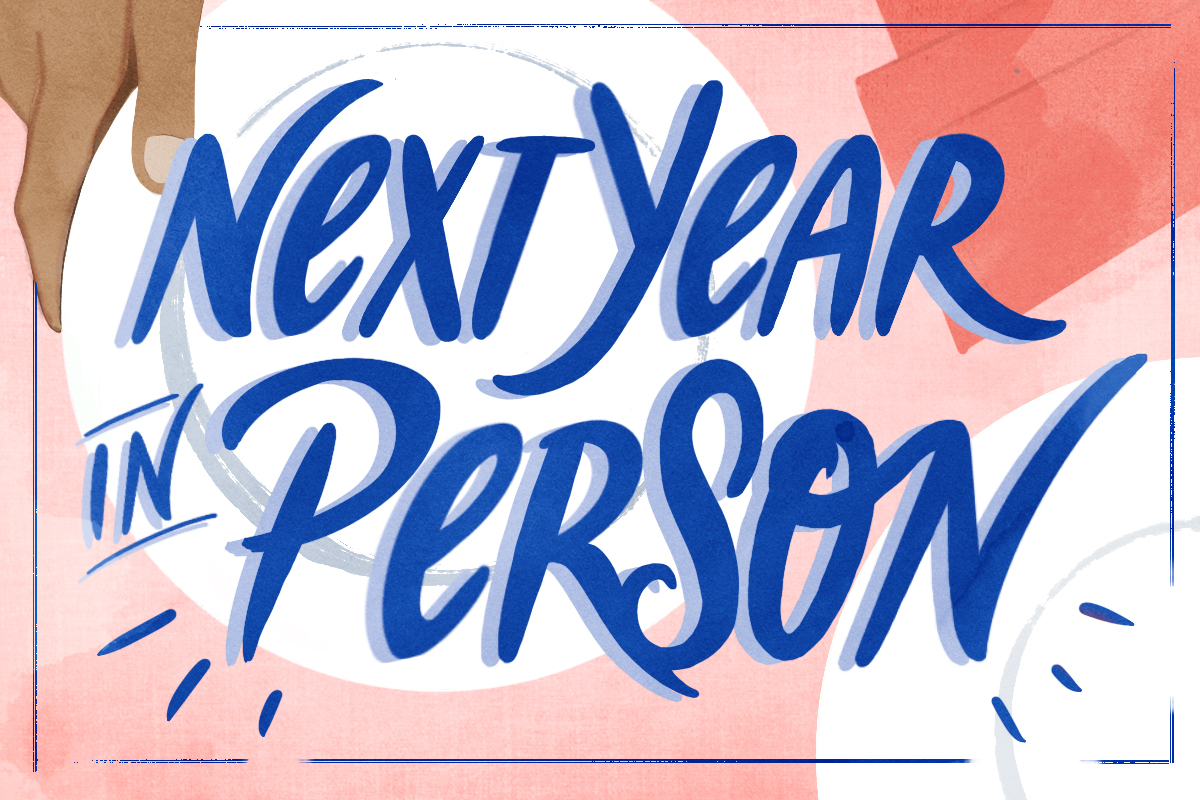Jews around the world ended their Passover 2020 seder on Zoom with an optimistic toast: “Next year in person!” Next year — we hoped — the pandemic would be behind us, and we’d be able to once again gather around a table and joke about how terrible everything was.
A play on the traditional end-of-seder phrase “next year in Jerusalem,” “next year in person” became part of how many news sites covered Passover last year, a rallying cry of hope and optimism amidst the fear and uncertainty of the pandemic. Haggadot.com, a platform that allows people to make their own Passover haggadahs, had many COVID-themed options, including one titled “Seder 2020: Next Year In Person.” As Nina Strochlic reported in National Geographic, “Many Jews end their Seders with a wish spoken in unison: ‘Next year in Jerusalem.’ This year, the mantra had changed to ‘Next year together.'”

Well, next year is here, and the pandemic is not behind us. Next year is here, and many of us can still not be in person with our friends and family. After a year of spending Rosh Hashanah, Yom Kippur, Hanukkah, and all kinds of life-cycle events on Zoom, a good number of us are gearing up for our second virtual Passover. Though we are closer to the end of this nightmare, thanks to the increasing vaccination effort and new CDC guidelines allowing for some families to gather in person, many Jews will once again gather virtually — or go solo — to mark the holiday of freedom.
Honestly, it’s hard to look back at the news stories and tweets from early April 2020, seeing how many people were certain that all of our 2021 seders would indeed be in person.
https://twitter.com/kaysarahsera/status/1248046564406419459?s=20
https://twitter.com/ShoshanaBean/status/1248063923539996672?s=20
Of course, hindsight is 2020 (in this case, literally). To try and make sense of how we were all feeling at this point last year — and how Jews are grappling with Passover this year — I turned to Twitter and reached out to some of the people who tweeted “next year in person” last year.
Carin Mrotz, the Executive Director of Jewish Community Action — a Minnesota nonprofit dedicated to racial and economic justice — thinks sharing “next year in person” last year cursed us for this year. In 2020, she tweeted about the virtual Freedom Seder she helped organize, ending her message with: “Next year, in person.” This year, Mrotz just wrapped up hosting their 19th annual Freedom Seder, online for the second year in a row. “Last year was terrifying, and our ‘next year in person’ was offered without any real belief that it would happen. We needed hope and it was hopeful. But behind the sentiment many of us were pretty sure it would be a year or longer before we began to gather in person again.”
“I’ve been thinking about this moment — as more people are getting vaccinated and are able to start moving about again — in the context of the Exodus story,” Mrotz added. “I think it must be a little like the moment the Israelites are fleeing, Pharaoh’s soldiers at their heels, and suddenly the Red Sea begins to part. There is still a lot of rough water ahead, but up ahead is a glimmer of light. And once we’re through the sea, there is still the desert ahead. A wave of evictions, the economic devastation and the huge losses borne by Black and brown communities. But here we are at the edge of the sea fleeing Mitzrayim [Egypt], and I swear there is a thin shaft of light up ahead.”
That optimism holds true for many. Arin Greenwood, a writer who lives in St. Petersburg, Florida, explains “there was a lot of anxiety wrapped up in ‘next year in person’ last time.” But, “now it feels more like waiting it out — getting vaccinated, getting so my family is safe enough we can travel to see each other.”
“Last year it felt like more of a desperate call and cry,” Greenwood explains. “This year it feels less that way — but I think we’ll still say it. Because that’s the hope. If this year has taught us anything it’s how much we care about family and being together. And how easily that can be taken away.”
Steph Svarz, a high school English and theater teacher in Chicago, is unsure if she’s going to be sharing “next year in person” this year.
“It feels hard write ‘next year in person’ for a second time to my family as we prepare for Passover 2021. I have a really large extended family and we try to get together every few years for a seder,” Svartz explains. “This pandemic has brought into sharp relief the gratitude I feel and acknowledgement that some of my family members might not be here for Passover of 2022. Even if our seder takes place online, having space to connect spiritually with one another over a favorite holiday is something I’m really looking forward to. So maybe this year, I’ll be writing, ‘next year together in spirit’ as a way to hold on to hope, regardless of the space in which we gather. If there’s one thing that feels distinctly Jewish, it’s a sense of hope!”
That hope holds true especially for those who have been vaccinated, or have vaccinations on the horizon. Megan Sass, a comedian, is getting her second shot the first day of Passover. “It is pretty symbolic,” she told me. “Because you’re fully vaccinated 10 days after the final shot, the end of Pesach, beginning of spring, and me being vaccinated will coincide!” Sass has never been a fan of the traditional phrase “next year in Jerusalem,” typically swapping it for something else. “I think it’s fair to say ‘in person with our loved ones’ is a great sentiment for our spiritual ‘Jerusalem’ in the year 2021/5781.”
Similarly, last year, when Abby Stein, a New-York based writer and activist, hosted her smallest seder ever — just four people — she ended it with “next year in person.” “We meant it. It was our response to isolation, to missing family and friends. Frankly, it had more meaning than ‘next year in Jerusalem’ ever had to me personally. In fact, it was what kept me, and I believe so many around us, going: This is a one-off,” Stein explained to me. Yet, once again this year, she is having a small seder with just her girlfriend and a cousin.
Looking to next Passover, Stein hopes we don’t forget the lessons of Passover this year and last.
“For next year, I am hoping that we will not just be in person physically, but also that we don’t forget the lesson from two Pesachs in ‘exile.’ That we take the messages of b’chol dor v’dor — in every generation — seriously. That we remember to invite those for whom virtual seder in 2020 and 2021 were the most they felt at home, because of lack of family and community. That we remember that we did not judge people for what they were wearing, or if they couldn’t afford festive meal tickets. That we remember that people could virtually celebrate with their partners, with their loved ones, regardless of gender and sexuality,” she says.
“Let’s make sure that we remember that virtual holidays gave so many — who might not be part of what we see as our ‘conventional’ community, whether because of gender, race, background, abilities, and more — access to community, and we take that with us into the in-person seders of 2022. L’Shanah Habah. Next year, with more inclusivity!”
Amen. To next year in person, for real this time.



